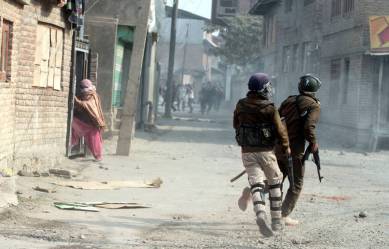Why not a Kashmir ‘plebiscite?’
As we go through yet another cycle of hand wringing over Kashmir, perhaps it is time to put aside irrational pride and ask some very practical questions.

India lives with a constant blister in its side, one that infects the moral stature of our nation and sucks up endless resources and attention. As we go through yet another cycle of hand wringing over Kashmir, perhaps it is time to put aside irrational pride and ask the very practical question: What does Kashmir do for us? Is it worth the price we pay? Is it worth the inordinate share of our defense and security expenses? The deaths of our brave security personnel? The large share of national and international attention? The beacon call that it is to jihadists? Can we reconcile Kashmir into the Indian nation?
While India is not without its flaws, we are a largely tolerant and free society, with a growing economy. About 1.2 billion of us live is a border-free state and are able to enjoy economic opportunity and the freedom to live anywhere in the country. If the people of Kashmir truly believe that they were dealt a bad hand at Partition, why not give them their demand and let them decide once and for all, whether to be a part of free and democratic India, or take the chance and join a chaotic Pakistan?
monthly limit of free stories.
with an Express account.
Why not call for some sort of a referendum today?
Before I launch into what is bound to be a controversial proposal, some important facts.
The state of Jammu & Kashmir comprises of 1% of our population, less than 1% of our GDP, and 4% of of our landmass (or 2% of our landmass if we exclude largely uninhabited Ladakh).It is essentially made up of 3 divisions: Jammu – population 55 lakhs (65% Hindu); Ladakh -population 3 lakhs (approx 45% Buddhist, 10% Hindu, 30% Shia Muslim); and the Kashmir Valley – population 70 lakhs (98% Muslim, mainly Sunni).
Essentially, all the civil strife, unrest, and dissatisfaction with the Indian state is limited to a small section of the people of the Kashmir Valley. Thus, I would propose calling a referendum in each of the three districts, thereby allowing each part of Kashmir to choose separately between being administered by India or Pakistan.
It is almost certain that Jammu and Ladakh with their Hindu, Buddhist, and Shia majorities, would choose to remain a part of India (the Shia, persecuted in most Sunni countries, enjoy complete religious freedom in India, and would be bitterly opposed to Pakistani rule). That would leave just the Kashmir Valley’s decision in doubt.
Opponents of a plebiscite in Kashmir generally cite three main reasons:
First, there is the historical-emotional argument that “Kashmir is an integral part of India”. I believe that this was a Nehruvian fantasy. The idea of India was always fluid in 1947. We have tried to live with Kashmir for three post-partition generations. However, it seems increasingly like a bad marriage. No amount of resources, development, or special statuses have been able to end the dissatisfaction of the Kashmiris, trapped as they are in a cycle of violence between their extremists and the response of the Indian security forces. It would be insanity to continue this cycle and expect different results. Thus, it is time to look at other options. I would like to note here that I speak with the greatest respect and gratitude to the innumerable martyrs in our armed forces that have fought to defend our Kashmiri borders. While their opponents may believe in martyrdom as an end to itself, I am sure that our soldiers would not want future generations to sacrifice themselves unless it was for the long term interest of our nation. Hence, the national discussion on Kashmir must be a rational and forward looking one, not one based on past sentimentality.
The second argument is one of national security. Most of Pakistan’s water and a small, but important, part of India’s originates in Kashmir. The control and maintenance of these waters is important. The mountains of Kashmir also form a defensible border against land based invasion. These concerns can be addressed by making demilitarisation a precondition to the referendum. Any future state would have to be without any army presence, and India must be permitted to retain a UN supervised force to defend its strategic points and its water supplies.
The final argument against a referendum invokes the fear of the threat to national unity – namely, if Kashmir can have a referendum today, why can’t other parts of India demand one tomorrow? I have always found this to be a weak argument. For right or wrong, Kashmir is demographically very different from the rest of India and its status has been legally disputed since 1947. No other part of the country has a similar situation. Also, surely, three generations on from Independence we are secure enough in our national identity to not have to worry about a Tamil Nadu or a Punjab making a successful claim for secession? I believe that the country would survive a loss of the Kashmir Valley, if it comes to that.
Thus, why not give ourselves a chance to once and for all break out of this endless and fruitless cycle of conflict?